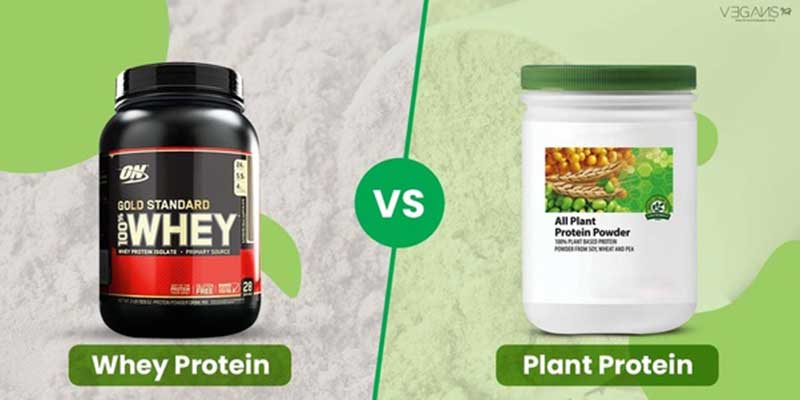Protein is an essential macronutrient that plays a crucial role in building and repairing body tissues, maintaining healthy bones and muscles, and regulating various bodily functions. When it comes to choosing a protein source, two of the most popular options are plant protein and whey protein.
However, many people are often unsure about which protein source is better for them and their fitness goals. Some prefer plant-based protein for ethical and environmental reasons, while others prefer whey protein because of its high biological value and complete amino acid profile. But which protein source is really the best?
Key Takeaways:
- Plant protein and whey protein are two popular sources of protein in the fitness and nutrition industry.
- Plant protein is gaining popularity among individuals seeking a sustainable and cruelty-free protein source.
- Whey protein, a derivative of milk protein, is known for its high-quality amino acid profile.
- Both plant protein and whey protein have unique nutritional values and benefits that need to be considered when choosing between them.
- The decision between plant protein vs whey protein ultimately depends on individual goals and preferences.
Understanding Plant Protein and its Benefits
Plant-based protein is derived from a variety of sources, including legumes, nuts, seeds, and grains. Compared to animal protein, plant protein sources are abundant in fiber, vitamins, and minerals, and can offer numerous benefits, including:
- Low in saturated fat: Plant protein tends to be lower in saturated fat than animal protein, making it a healthier option for individuals.
- Better for the environment: Plant-based sources are often more sustainable and ethical than animal-based sources, reducing our carbon footprint and promoting animal welfare.
- Reduced risk of chronic diseases: Plant protein intake has been linked to a lower risk of chronic diseases such as obesity, diabetes, and heart disease.
- Increased fiber intake: Many plant protein sources are rich in fiber, which can improve gut health and digestion.
There are numerous plant-based protein sources, including:
| Plant Protein Sources | Amount of Protein per Serving |
|---|---|
| Lentils | 18g |
| Quinoa | 8g |
| Chickpeas | 7g |
| Almonds | 6g |
| Tempeh | 15g |
When comparing plant protein to animal protein, it is important to note that plant protein sources are often incomplete, meaning they lack one or more essential amino acids. However, by combining various plant-based protein sources, you can create a complete amino acid profile and receive the same benefits as animal protein picksmart.co.
Overall, plant-based protein offers numerous benefits, making it a fantastic option for vegans, vegetarians, and individuals who want to reduce their animal product consumption.

Exploring Whey Protein and its Advantages
Whey protein is a popular source of protein among fitness enthusiasts and bodybuilders due to its high-quality amino acid profile and fast absorption rate. It is derived from milk protein and is available in three forms: concentrate, isolate, and hydrolysate.
Benefits of whey protein
Whey protein is a complete protein source, meaning it contains all the essential amino acids that our body needs. It is rich in leucine, an amino acid that plays a crucial role in muscle growth and repair. Whey protein is also easy to digest and quickly absorbed by the body, making it an ideal post-workout supplement.
Whey protein sources
The primary sources of whey protein are milk and cheese. The most common types of whey protein supplement are whey protein concentrate, isolate, and hydrolysate.
| Whey Protein Source | Protein Content | Fat Content | Carbohydrate Content |
|---|---|---|---|
| Whey Protein Concentrate | 70-80% | 4-6% | 4-8% |
| Whey Protein Isolate | 90% | 0.5-1% | 0.5-1% |
| Whey Protein Hydrolysate | 80-90% | 0.5-2% | 0.5-2% |
While whey protein concentrates contain a higher percentage of carbohydrates and fats, they are also cheaper and have a better taste. On the other hand, whey protein isolates and hydrolysates are more expensive and have a lower carbohydrate and fat content.
Conclusion
Whey protein is a highly beneficial protein source that is popular among fitness enthusiasts due to its high-quality amino acid profile and fast absorption rate. It is available in three forms, concentrate, isolate, and hydrolysate, each with its unique properties and benefits.
Nutritional Comparison: Plant Protein vs Whey Protein
When it comes to muscle gain and recovery, protein is an essential macronutrient. Plant protein and whey protein are two popular sources of protein in the fitness and nutrition industry. In this section, we will analyze their nutritional values, absorption rates and their effectiveness in muscle gain and recovery.
| Protein Source | Amino Acid Profile | Absorption Rate | Effectiveness for Muscle Gain and Recovery |
|---|---|---|---|
| Plant Protein | Plant protein is often considered less effective in terms of its amino acid profile, as it is generally lower in essential amino acids such as leucine and lysine. However, it can be a good source of non-essential amino acids and is often fortified with additional nutrients such as iron and calcium. | Plant protein has a slower absorption rate, as it takes longer for the body to break down plant-based proteins. However, this can also mean that the body is able to absorb more nutrients over a longer period of time. | Plant protein can be effective for muscle gain and recovery, particularly for individuals who follow a vegetarian or vegan lifestyle. However, it may require larger amounts of protein and/or a combination of different plant-based proteins to achieve the same results as whey protein. |
| Whey Protein | Whey protein is considered to have a high-quality amino acid profile, particularly when it comes to essential amino acids such as leucine and lysine. It is often considered the “gold standard” of protein sources in the fitness industry. | Whey protein has a fast absorption rate, as it is quickly broken down and absorbed by the body. | Whey protein is highly effective for muscle gain and recovery, particularly when consumed after a workout. It is often recommended for individuals who engage in high-intensity exercise and those looking for quick recovery times. |
In summary, both plant protein and whey protein can be effective sources of protein for muscle gain and recovery. However, whey protein is generally considered to have a higher quality amino acid profile and a faster absorption rate, making it a more efficient option for individuals looking to maximize their muscle growth and recovery. That being said, plant protein can still be an effective option, particularly for individuals who follow a vegetarian or vegan lifestyle.
The Environmental and Ethical Considerations
As the world becomes more conscious of environmental and ethical issues, the demand for plant-based protein continues to grow. Plant protein is derived from crops such as peas, soy, and leafy greens, which have a significantly lower carbon footprint than animal-based protein.
On the other hand, whey protein is derived from milk, which comes from cows, a significant source of greenhouse gas emissions. In addition, animal agriculture has been linked to deforestation, water pollution, and animal cruelty, making it an unsustainable and unethical source of protein.
Plant-based protein is not without its challenges, however. The production of some crops requires large amounts of water, and the transportation of plant-based protein products may increase carbon emissions. Additionally, some individuals may argue that plant-based protein lacks the same nutritional value as animal-based protein, although this argument has been largely debunked.
Despite these challenges, the rise of plant-based protein is a positive step towards a more sustainable and ethical future. Whether you choose plant protein or whey protein ultimately depends on your individual values and goals.
Conclusion
After exploring the differences, benefits, and nutritional values of plant protein and whey protein, it is clear that they both have unique advantages and drawbacks. As we have seen, plant protein is a sustainable and cruelty-free protein source that offers numerous health benefits and is suitable for a wide range of dietary requirements. However, whey protein has a high-quality amino acid profile, is effective in muscle gain and recovery, and is easily accessible in various forms.
Ultimately, the choice between plant protein vs whey protein depends on individual goals and preferences. If you prioritize sustainability and ethical considerations, plant protein is an excellent choice. However, if you are seeking to build muscle and recover more quickly after workouts, whey protein may be the better option.
However, it’s important to note that both plant protein and whey protein can be used in conjunction with each other to maximize their benefits. For example, you can use plant protein during your daily meals and incorporate whey protein after workouts for an added boost in muscle recovery and growth.
Final Thoughts
Choosing between plant protein vs whey protein can be overwhelming, but by understanding the unique benefits and drawbacks of each protein source, you can make an informed decision. Remember to prioritize sustainability, ethical considerations, and your personal health goals when deciding which protein source is best for you.
Thank you for reading and we hope this article has helped you unravel the truth in nutrition!
FAQ
What is the difference between plant protein and whey protein?
Plant protein is derived from plants, while whey protein is derived from milk. Plant protein is often considered a more sustainable and cruelty-free option, while whey protein is known for its high-quality amino acid profile.
What are the benefits of plant protein?
Plant protein offers numerous benefits, including being a sustainable and cruelty-free protein source. It is also rich in fiber, antioxidants, and essential nutrients. Additionally, plant protein is typically easier to digest and can support overall health and well-being.
What are the advantages of whey protein?
Whey protein has a high biological value, meaning it is easily absorbed and utilized by the body. It is rich in essential amino acids, particularly leucine, which is important for muscle growth and recovery. Additionally, whey protein can help support immune function and promote satiety.
How do plant protein and whey protein compare nutritionally?
Plant protein and whey protein have different amino acid profiles. While whey protein is a complete protein, meaning it contains all essential amino acids, some plant proteins may be incomplete and require combining different plant sources to ensure a complete amino acid profile. Whey protein is also known for its faster absorption rate, making it ideal for post-workout recovery.
Are there any environmental or ethical considerations when choosing between plant protein and whey protein?
Yes, there are. Plant protein is often considered more sustainable and environmentally friendly as it requires fewer resources and produces fewer greenhouse gas emissions compared to animal-based protein sources. Additionally, choosing plant protein over whey protein can be a more ethical choice as it avoids supporting the animal agriculture industry.
What is the conclusion of the plant protein vs whey protein debate?
The conclusion ultimately depends on individual goals and preferences. Both plant protein and whey protein offer unique benefits and can be suitable choices for different individuals. It’s important to consider factors such as dietary restrictions, environmental impact, and personal health goals when deciding between the two.













Got a Questions?
Find us on Socials or Contact us and we’ll get back to you as soon as possible.